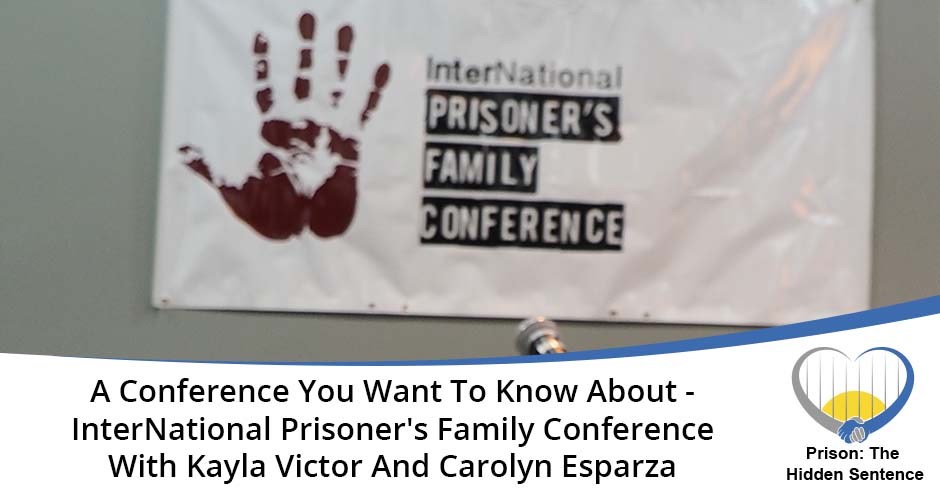
Where can people who have loved ones in the criminal justice system, law enforcement and the judicial system, mental health professionals, legislatures, government officials, scholars, teachers, professors, and communities come together to share stories and learn from each other? They can come together at the InterNational Prisoner’s Family Conference! Kayla Victor and Carolyn Esparza talk about the International Prisoner’s Family Conference in this episode. They both share the history of the International Prisoner’s Family Conference and highlight their experience. Listen to this informative podcast filled with stories and must-know information for anyone affected by or involved with the criminal justice system.
—
Listen to the podcast here
A Conference You Want To Know About – InterNational Prisoner’s Family Conference With Kayla Victor And Carolyn Esparza
I’m here with Carolyn Esparza and Kayla Victor. Carolyn has been advocating for families who have loved ones in the criminal justice system. For many years, she saw a need to bring the community together to raise awareness about the effects of incarceration on families. 2022 is the fourteenth year of the InterNational Prisoners Family Conference and that’s what we’ll be talking about in this episode. There’s so much history here and things that will be so interesting for everybody to learn.
Kayla Victor is an integral part of the success of the conference, bringing years of event and project management experience. As a result of her involvement with the conference, she’s become an advocate for the prison family. Thank you both for being here. I’m so excited about speaking with both of you and talking about this conference that I’ve been a part of for several years myself. Let’s start with Carolyn. How did you get involved with the criminal justice system?
The trip to prison came from my work in adoption for probably about 6 or 7 years. Things happened. The agency I was working for got closed so I went into private practice. One of the attorneys that I had met when I worked in adoption called me one day and asked me to go to the county jail to meet with a young man that he was sure had attempted to murder his mother because he had been adopted.
It’s a very intricate winding of the roads that got this together. Long story short, I went to the county jail, met with the young man and left dismayed that every system that had touched this young man’s life had failed him. First was the child protective services that wrenched him out of the hands of his mother, the foster care system that he and his younger brother went through together for many years until he was adopted, and then the mental health system that never talked to him until I talked to him about his adoption.
I said, “This kid is going to prison because he was adopted.” He also is a very severe alcoholic and that played into all of his problems as well. I couldn’t stand that our systems are in such trouble that they’re failing our children, families and us as a community. I was determined to do something about it. I started seeking avenues and Kayla might even be able to shed some light on how I got involved with prison ministry.
The prison ministry work led me to work inside juvenile facilities and then later adult facilities that incarcerate people. I started thinking, “We’re doing a lot of work with these kids,” especially in the juvenile system at the time. There’s very little mental help that goes on inside of our prisons. I thought, “We’re trying to change these people and make them come back into our community in better shape than we sent them away. We’re doing nothing to help them get there. That has a lot to do with the outside community.”
The community needs to know that these people that we incarcerate have families that are very strongly affected by the person’s incarceration. We also have these people coming back to our communities in much worse shape than we sent them away. I thought of ways that we could do something about that.
One day, it came to me as a conference. We would invite anybody with any interest to come to a conference and start talking to them about prison families, people that are actual human beings, have a need for support and love of the community and are not getting it, especially people returning from the prisons into the community.
Carolyn, thank you for sharing that. A lot of people see things, shake their heads and go, “That’s horrible.” They then move on. We see that a lot on the news too with everything that’s happening. Not a lot of people step up and do something. I want to thank you, first of all, for seeing that there’s a need for change and taking a step to make that change. What was your capacity? What was your job back then when you got involved with this? You had some credentials to be working with people.
At that time, as I came out of the field of adoption, I had my Master’s in Social Work. Later when I went to work in the criminal justice system, I also had a Professional Family Counselor license. I did have some credentials for doing the work that I was doing but when you get into the criminal justice system, we don’t need credentials because they don’t have any mental health or emotional support work going on. I couldn’t get off for continuing education or any time to do more studying. That’s why I was a Licensed Professional Counselor later on.
When you enter the criminal justice system, you don't need credentials because they don't have any mental health or emotional support work. Share on XI wanted everybody to know what you were doing back then and how you got involved. I wanted to go over to Kayla to see if she wanted to add anything you had mentioned to the process before we go into talking about the conference.
I believe that one of the things that she was talking about before was the fact that as a kid, I was walking through the mall and saw a Christmas tree. They had cards with the names of the kids. I told my mom, “Isn’t that sad that these kids aren’t going to get any toys if somebody doesn’t get a gift for them?” She got involved with a prison fellowship at the time and it blossomed from there.
What we didn’t acknowledge is that Kayla was my daughter.
Kayla has been on the journey with you and has been an integral part of this whole conference. We’re so fortunate to have her and you.
She was the one who started it back when she was fourteen years old and brought that information back to me about prison fellowship and the angel tree.
Carolyn took a hold of it and moved forward with it. Let’s talk about how you even got the conference started. You take an idea and there are people out there but how do you get this started and have it going for several years?
It’s pretty amazing because, at that time, there was very little available for prison families for support. We did have the internet in its rudimentary stages such as it was. I did get on there and look for other organizations that might be working with families of prisoners. Sure enough, there were two that I found back then and dredge up. One was in New York and one was in Albuquerque, New Mexico. I contacted them and asked them how they would feel about putting together a conference.
They were ecstatic that the idea had come forth. They weren’t willing to do it but they were willing to support me and let people know that were on their mailing list. The lady at the time was in Albany, New York. Some advertising went out through email. Electronically, we put together a very fruitful conference in El Paso, Texas, which is where I was at the time. People were so hungry for the support that this could offer them that they did come from all over the United States at the time.
At that time, it was the Prisoners Family Conference. Now, it is the InterNational Prisoners Family Conference. The word got out across the world about this wonderful conference. When did it become international?
I’m so bad with numbers. Francis Ssuubi from Uganda contacted me. I believe it was the third year of the conference. I’m not 100% sure. He has a ministry for children of prisoners in Uganda and was looking to grow that ministry over there. He contacted me and asked if he could come to the conference. He then contacted me the following year. This was like the 3rd or 4th year of the conference and asked if we could do a side meeting of people interested, especially children of prisoners.
Once he did that, it opened the doors for people to come from all over the world, from South America to the UK, everywhere. They did come and had their side meeting. Over the years since then, it has grown into a special side group essentially, another nonprofit organization specifically addressing the needs of children of prisoners. We’re very proud to have added that component by electronic connections.
Isn’t that the International Coalition for Children with Incarcerated Parents that was born at the conference? It’s your idea to bring people together and they could come together to join this other organization that’s helping children with incarcerated parents all over the world. It’s wonderful. I keep saying wonderful. That’s my word for this episode.
It’s awesome to know the power that this little conference has had.
Let’s talk about some of the highlights of the conference. If you look back over the years, you’ve had so many people come and present at the conference. Is there anything that stands out in your mind of somebody that presented or somebody that you met there? We have a mayor that came.
We’ve had so many amazing people. I often say that the best people I’ve ever met in my life I met at the InterNational Prisoners Family Conference. It’s a great question. I remember that everything to me was a highlight. Every conference became the best conference. It never failed that we would leave the conference the next year and say, “That was the best conference we ever had. The people were amazing.”
Whom you’re talking about is Frank Deese from North Carolina. He’s an amazing man who went to prison when he was younger. He’s a full-grown adult now. I don’t know exactly how old is but he’s been mayor of Marshville, North Carolina for ten years. He left that position thinking he could do more for his community if he became the city manager.
He’s been, for many years, the City Manager for Marshville. He is an amazing human being who wrote the book From Inmate to Mayor. It is wonderful. He will have a role in the fourteenth-year conference. We’re excited to be seeing him. We stayed in touch with him mainly electronically. He has stayed in touch with us and let us know how much he appreciated the conference. He says it did a lot for him while he’s done a lot for us too. We have a lot of people who have success stories that have come to the conference, shared their stories and gone on to super great things.
One of the ones that come stands out in my mind though is from the very first conference, I was looking to make a program to pass out to people when they came to our conference. I wanted a picture for the program. I looked up the word prison on the internet and the first thing that popped into my face was a gray-haired man, clean-cut. I’m going, “What in the world would it have to do with prison?”
I was curious. I opened his website. His name is Chuck Gallagher. He too has written a book about 25 steps that he took that changed his life as he also walked into prison some years prior. I was so curious that his face hopped up the first thing for prison that I had to contact him and I did. He’s come back to his fourth conference with us.
One of the things he said when he talked to us the first time is that he knew coming out of prison that he would have to take a job that nobody else would ever want. He looked in the newspaper and found a job selling burial plots door to door. That was a lot of years ago. Now, he is Vice President of American Funeral Financial, LLC. He’s in a huge position and heading up the whole place from door-to-door sales of burial plots.
People need to think about that. The reason I bring that up is that when people come out of prison, they think that they should be doing great things immediately. It doesn’t happen. It took Chuck many years to climb that ladder. I love for him to tell that story so people know the reality they face when they come back into the community.
When people leave prison, they think they should be doing great things immediately. It doesn't happen. It takes many years to climb that ladder. Share on XI think back on the years that I’ve gone to the conference. All the people that I’ve met and the stories that you’re telling brought light to us what’s going on out there. There are things that we wouldn’t know but by coming together and sharing stories, we see that we’re not alone but we also see a light at the end of the tunnel. We see that there’s hope when somebody is coming out of prison or we have a loved one that’s incarcerated. That’s not the end of the world. We can work together.
The conference shows us ways that we can do that and how we can learn from others that have been incarcerated. There are so many good things that do come out of the conference. Kayla, I want to go to you and see a different perspective. You have a different perspective of the conference. You’re making sure that everything is working and we’re all there at the right time doing the right thing. What are some highlights that you have from the conference that might be different from your mom’s?
I’m always excited to see all the different speakers. I was thinking when you were talking about Fury Young and the amazing work he’s doing with the Die Jim Crow project. One of the things that are so amazing about him is I have somebody like Barbara Allan and my mom. They love the music that’s being produced by the work that he’s doing. Those are people that you wouldn’t expect to be together.
Seeing things like that is pretty amazing. Seeing family members who feel that they’re open to being themselves, taking phone calls or whatever they need to do during the conference and not feeling judged is probably something that I admire. I’ve always learned too that the most important thing to do when we’re having the in-person conference is to make sure that there’s tissue paper on the tables because some of the stories are very heartfelt. Those are some of the highlights for me.
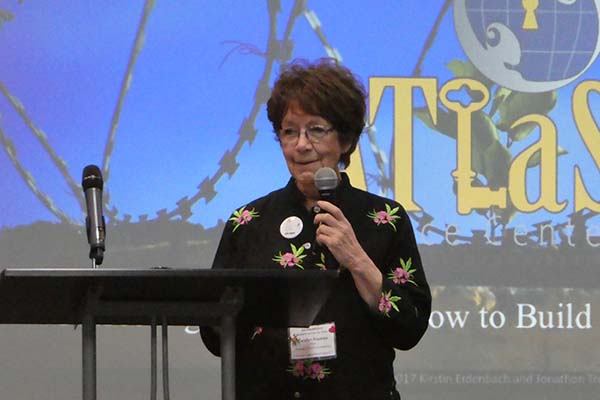
Carolyn, something that stands out for me and it’s somebody that I met is a young man that you helped when you were working as a social worker in the juvenile system and he came out when he was in his 40s. Can you tell us a little bit about that story? I find it amazing how you’ve helped this young man. You stayed in touch with him from when he was young through his whole journey.
You’re talking about Terrence Sampson and I can use his name. He went into the system when he was twelve for a very serious crime. I was counseling at the Texas Youth Commission at the time and he was assigned to my dorm. As we were doing counseling, there was evidence of great remorse for his crime but he was twelve years old. He could only have remorse at the level a twelve-year-old is capable of having remorse. I noticed that he sobbed over what he realized he had done.
I became very close with him more so than with many other people. Part of that was because the system had formally decided to treat him differently than they treated all the other kids that were at the juvenile facility. I thought it was so unfair because he was a kid. It was a horrible crime and terrible victimization. I always talked to him about that and brought up that I could relate to the victims that were left behind.
Long story short because it was a 35-year journey, I followed him as he was transferred from the juvenile facility to the adult facility. At that time, we could only contact by writing each other. He liked to write and read. He got two college degrees while he was in prison. Long story short, he did come out of prison at 42 years old but in many ways, 12 years old.
That’s because people socially die the minute they enter prison, no matter what age they are. If he had been 25 and it’s been 35 years, he would have been 25 when he came out. We need to remember that. They don’t grow while they’re in prison. There’s no opportunity. Mentally, he grew. He was extremely bright but when he got out, the very first thing he did was contacted me and let me know he was out. The very first thing I did was invite him to the conference.
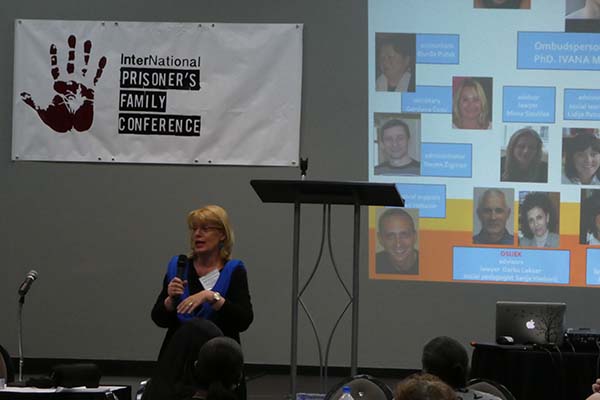
He came to the conference and did act very appropriately. He did a wonderful presentation at the conference and met some very supportive people that he has been working with since he attended that conference. He wants to spread his wings a little bit and see if he can make some steps on his own. We hope he’ll grow a little bit more. Maybe he’s not twelve anymore. Maybe he’s sixteen. We’re glad to help him grow.
Kayla has provided some contacts for him and worked with him. In a very unusual way, he’s very much a part of our family. We as counselors aren’t supposed to add favorites. I had many other kids that I cared about deeply. It happened that Terrence was willing to hang with me as I hung with him. It was great to be able to bring him to the conference.
His story was so powerful. You worked with him. He was such a wonderful person. I feel honored that I got to meet him and hear his story. It was so hard to believe for somebody so young. One of the things that I did speak to him and he talked about is restorative justice. He got to speak to the victim’s family and it opened his eyes to how important the restorative justice program is in the prisons that he went through. I didn’t know about that so I wanted to mention that.
He wanted to do that for many years but the victim’s mother was not ready for it. Once she became ready, she also acknowledges that it’s been very healing for her in the restorative justice programs and goes around to the person who talks to people that are victimized.
You spoke about reentry and how important it is, especially starting at day one for the family. The 2022 conference theme is reentry. Kayla, do you want to talk a little bit about the 2022 theme?
2022’s theme is successful reentry. You covered a lot of those stories about success reentry and people that are going to be speaking at the conference. We still have some people that have not been announced yet and those will be announced in the future. We have some great content. We’ve got Fritzi Horstman, the Founder of Compassion Prison Project. Her research shows that 98% of the men and women living in prison have at least one adverse childhood experience. She will be conducting a session on trauma and what it does for the brain, body and spirit.
We have Professor Nancy Loucks from Scotland, who is also an INCCIP. She’s I believe the Chair for them. She’s also with Families Outside. She’s going to be speaking with Asha Anderson from the family’s perspective on death in prison custody. We’re excited. All three of us have had the opportunity to sit down with her and be interviewed.
Emma Lugo from Prison Pipeline is going to be discussing the transformative power of radio to allow adults in custody and have authentic stories. We’re excited about all of those types of people. People can stay tuned to you. They can also take a look at our website at PrisonersFamilyConference.org and find out more information as we’re listening to new speakers.
We did talk about reentry and it’s a great topic because people don’t realize that it starts on day one. You had mentioned Barbara Allan who says that reentry starts on day one. A lot of us say that. Thank you. I’ve heard her say it. Barbara and I met at the conference and talk about another synergy. We came together with our separate groups and joined one group called Prison Families Alliance, which provides support to families. Many people met at the conference but I don’t think there have been any weddings. I don’t know about that.
We talk about the ripple effect of the conference that very quickly brought people together like you with us but you with Barbara. You have a support group essentially for everyone. Everyone can be part of your virtual online support group. A lot of other community groups have merged, grown, blossomed and popped up from coming to the conference or even hearing about the conference. People are coming out of prison and talking about the experience instead of hiding in shame. The conference has been largely responsible for that over the past years.
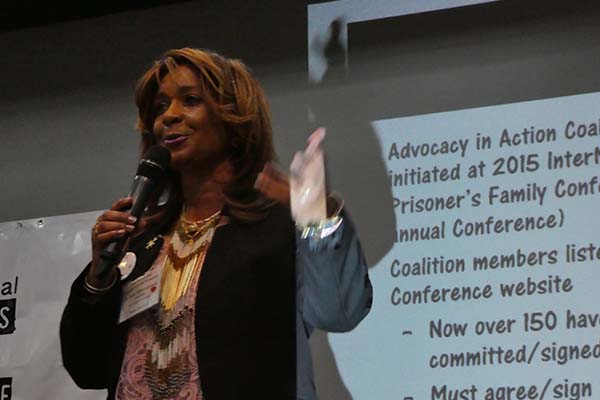
When we started this conference, people came out of prison and went into hiding. They never talked about it again and never wanted to talk about it again. Now, they not only do talk about it but they want to talk about it. It’s very healing to talk about trauma and traumatic experiences. Another thing is to remember that not only does the conference affect the people that go there, although that’s the best way to be affected by it, but through a ripple effect, it also affects people going to it and bringing it back to their communities.
There was a time when the pandemic hit and something happened with the conference. Kayla, do you want to talk a little bit about how the committee decided to move forward with the conference during the pandemic and how it thrived?
It was interesting because nobody heard of Zoom at the time. We had to do a lot of research to figure out where we were going to put the conference. One of the things is we wanted to make sure that we persisted, moved forward and were able to bring people together from around the world. We did. We moved to a conference online and virtually.
For two years during the pandemic and in 2022 with the air flights being so expensive for people to come, the board made a decision to make sure that we still have the conference and move forward. That’s why we’re going to continue to stay virtual. Maybe one day we’ll be able to get back in person, which would be great. Maybe have a small component that’s virtual. That’s what I hope.
One thing that people say about the conference and we’ve tried to do even virtually is that everybody’s a family member. It’s like a family reunion. It’s great to hug and see people. Everybody follows each other after they’ve met on Facebook and that type of stuff. Some people that have met virtually continue but it’s always much better to be in person and being able to communicate however we can.
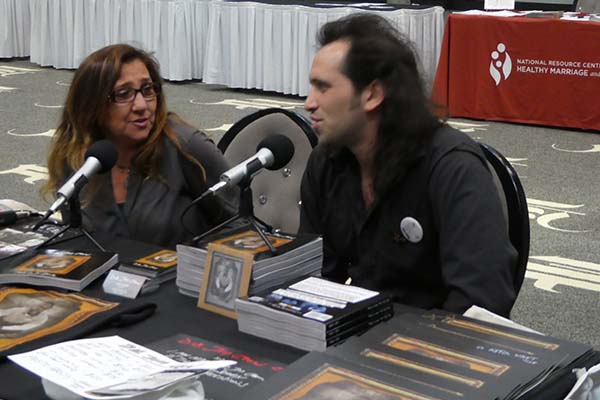
People can still meet virtually. I’ve made a lot of connections through the conference virtually. Some of the facilitators for Prison Families Alliance are people that Barbara and I met at the conference. Even though we’re not together in person, there still have that part of it where you have empathy and compassion, where you feel close, not being judged, feel safe in that environment and you can talk to people and meet people, especially learning about all of the stuff that’s out there.
One of the biggest things for families is that they find out that they’re not alone and that other people are experiencing the same things. The conference provides so much value to anybody that has somebody that’s incarcerated or somebody that’s even involved in the prison system like social workers, law enforcement, attorneys or anybody that’s out there to open their eyes and lift the curtain to what’s going on with the families. Carolyn, you’ve done that. You’ve done such a great job of raising awareness and bringing people together.
That idea was to humanize the prison family. In so many ways, it’s done that but there is something to be said for being able to have one another, for a social worker or a law enforcement person to be able to come into the same room and embrace the person who’s been affected by the criminal justice system. All the things you said are so important. We can hardly express it all in an hour or any brief presentation like this.
That’s why we encourage people to be there. You can’t know the effect of something like a conference that will embrace you no matter what your role is in criminal justice. It will embrace you because we want you to be better for everybody who’s affected by it, whether you work in it or live in it. It’s important to humanize it for everybody.
Encourage people to attend a conference that will embrace you no matter your role in criminal justice because we want it to be better for everybody affected by it, whether you work in it or live in it. It's important to humanize it for everybody. Share on XCarolyn, there’s one thing that I hear you say a lot, and that’s about the victims. You could probably say it a lot better than I can. We’re humanizing people, but we’re recognizing that there are still victims out there.
It’s so important that you brought that up because we talk a lot about the people who’ve done the crime and what I’ve heard on the news was nobody cares about the victim. They only care about being soft peddling and coddling prisoner and their family. That’s not true. We talked about Terrence and the victim’s family every time we met while he was in the juvenile facility.
This is about victimizing and creating fewer victims. What we’re talking about is making people who go to prison healthy so when they come back to our communities, they’re not making more victims and victimizing more people. We do care about victims. Some of us have been victims ourselves and we don’t want other people to feel the terror, the horror, the sadness, the grief or whatever it was that victimized us. We’re talking about prisoners but we’re talking about it because everybody has ignored them for so long that we created a monster of a system.
Excuse me for being so bold and honest about it but that’s a fact. Our criminal justice system does nothing for anybody and it won’t until it takes into account that the people that it’s incarcerating are human beings and certainly their families out here in the community are. That’s one of the things we want to emphasize but you’re right. We also must respect the victims because they’re the ones that are hurting out here. We want them to know that we care about them very much.
The criminal justice system does nothing for anybody, and it won't until it considers that the people it's incarcerating are human beings. But we also must respect the victims because they're the ones that are hurting out here. Share on XThank you for adding that. I know that you always say that’s important so I thought it was important to bring it in here. One of the things that we haven’t said and Kayla can provide that information is when is the conference in 2022.
The conference is on October 19th, 20th and 21st. It will be virtual.
Where can they sign up for the conference?
At PrisonersFamilyConference.org. Go to the registration page and sign up.
Is there an email if somebody has questions?
That’s Info@PrisonersFamilyConference.org as well.
This has been so insightful. I’m so excited about the conference in 2022. I’m so glad that you guys could take the time to speak with me. I know you have a lot going on. Many good speakers are going to be at the conference. I can’t wait. Thank you so much.
Thank you.
Important Links
- InterNational Prisoners Family Conference
- International Coalition for Children with Incarcerated Parents
- From Inmate to Mayor
- Chuck Gallagher
- American Funeral Financial, LLC
- Terrence Sampson – Facebook
- Compassion Prison Project
- Families Outside
- Asha Anderson – LinkedIn
- Prison Pipeline
- Prison Families Alliance
- Registration Page
- https://PrisonersFamilyConference.org/The-Conference/
About Carolyn Esparza
 Carolyn Esparza is founder, president and conference chair of the InterNational Prisoner’s Family Conference. She started the conference in 2008 in an effort to bring people together to educate, support, and bring awareness to the impacts of incarceration on the prison family: those incarcerated and those on the outside.
Carolyn Esparza is founder, president and conference chair of the InterNational Prisoner’s Family Conference. She started the conference in 2008 in an effort to bring people together to educate, support, and bring awareness to the impacts of incarceration on the prison family: those incarcerated and those on the outside.
Through her work as a social worker, she helped many people that were affected by incarceration. She has helped thousands of people over the years and continues her work.
Carolyn is also a speaker and author. She published “The Unvarnished Truth About The Prison Family Journey.” Carolyn has been a leader in the community advocating for change to help those affected by incarceration.
About Kayla Victor
 Kayla Victor is a curiosity enthusiast who has worked on an eclectic range of projects including; helping companies build and leverage business to business relationships and bridge community outreach efforts while having the most fun possible.
Kayla Victor is a curiosity enthusiast who has worked on an eclectic range of projects including; helping companies build and leverage business to business relationships and bridge community outreach efforts while having the most fun possible.
Kayla has been the event coordinator for the International Prisoners’ Family Conference for the past 12 years. She is a solution based problem solver who thinks strategically outside of the box and looks at businesses from a 360 degree viewpoint and strategizes to always put people first. Her diverse experience; includes working with a variety of companies, from small business to Fortune 500 including an eclectic range of projects in communication integration, advocacy, government affairs, marketing strategies, project management, business development, entertainment and food/hospitality management.
Ms. Victor mentors many young adults, volunteers with a variety of organizations and is passionate about teaching kids they have boundless opportunities to build their skills and guiding them to see a more productive future.

Virginia Griffin says
Thank you for all you are doing. My loved one entered the system at 73 years old. First offense. We were and are devastated. My loved one has a desire to do on the inside what you are doing on the outside. Preparing inmates to return to society. He is involved with the character building dorm programs and amazing opportunities are evolving. This is new to me and each day is different. A lot of marriages end with our situation but we are united and I too desire to help marriages survive. The system absolutely teaches hopelessness without outside advocacy. Many have no one! Please continue getting the awareness. I cannot afford to join the conference. I do participate in PFA support group meetings which I give credit to helping my tears become a voice to advocate for all. Indeed, we are human beings and should receive decent treatment. It is against the law to treat my pets the way my loved one is treated. No ac in temps over 100 degrees for example.
Thanks again.
Virginia G.
fgrif1046@gmail.com
john.hawkins says
Please take care of you and continue attending the meetings. You are not alone.